This content originally appeared on Democracy Now! and was authored by Democracy Now!.
This post was originally published on Radio Free.
This content originally appeared on Democracy Now! and was authored by Democracy Now!.
This post was originally published on Radio Free.
This content originally appeared on Democracy Now! and was authored by Democracy Now!.
This post was originally published on Radio Free.
This content originally appeared on Democracy Now! and was authored by Democracy Now!.
This post was originally published on Radio Free.

Despite a U.N.-backed report sounding the alarm on imminent famine in northern Gaza, Israeli authorities announced Sunday they will no longer approve the passage of any UNRWA food convoys into northern Gaza. “Our ability to adequately continue saving lives is really being obstructed,” says UNRWA spokesperson Tamara Alrifai. “What’s going to happen to UNRWA if we can no longer truly operate?” The decision came as President Biden signed a $1.2 trillion appropriations bill that strips funding to UNRWA for the next year. The U.S. first suspended aid to UNRWA in late January, when the Israeli government claimed 12 of the agency’s 30,000 employees were involved in Hamas’s attacks on October 7. The unsubstantiated allegation prompted top donors to cut funding to UNRWA, though many of them have resumed funding as the agency welcomes new donor countries and an unprecedented number of civil society donations. Seeing the U.S., the agency’s largest donor, “withhold funding … is a huge blow to us,” says Alrifai. “Stripping UNRWA of funding not only shrinks its ability to respond to the looming famine in Gaza, but also puts at risk the schools, the access of kids to proper education, the vaccines, the mother and child care — everything across the region.”
This content originally appeared on Democracy Now! and was authored by Democracy Now!.
This post was originally published on Radio Free.
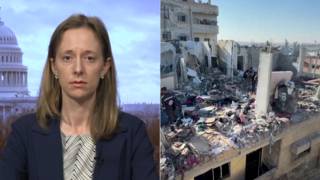
A State Department official working on human rights issues in the Middle East resigned Wednesday in protest of U.S. support for Israel’s assault on Gaza. Annelle Sheline, who worked as a foreign affairs officer in the Bureau of Democracy, Human Rights and Labor, was not planning on publicly resigning, but her colleagues asked her to “please speak out” against the Biden administration’s unconditional support for Israel. “At the end of the day, many people inside [the State Department] know that this is a horrific policy, and can’t believe that the United States government is engaged in such actions that contravene American values so directly, but the leadership is not listening,” says Sheline. “I’m trying to speak on behalf of those many, many people who feel so betrayed by our government’s stance.” Sheline describes being moved by the words of Aaron Bushnell, the active-duty U.S. airman who set himself on fire outside the Israeli Embassy in protest of the war on Gaza, who implored everyone to take a stand against genocide. “I have a young daughter, and I thought about, in the future, if she were to ask me, 'What were you doing when this was happening? You were at the State Department.' I want to be able to tell her that I didn’t stay silent.”
This content originally appeared on Democracy Now! and was authored by Democracy Now!.
This post was originally published on Radio Free.
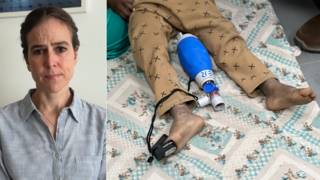
Almost six months into Israel’s assault, Gaza’s health sector has been completely decimated. Before October 7, Gaza had 36 hospitals. Now only two are minimally functional, and 10 are partially functional, according to the United Nations. The rest have shut down completely after either being shelled, besieged and raided by Israeli troops, or running out of fuel and medicine. Israel’s assault has killed over 32,500 Palestinians, including over 14,000 children, and wounded nearly 75,000. We speak with Dr. Tanya Haj-Hassan, a pediatric intensive care physician who just spent two weeks volunteering and living at Al-Aqsa Martyrs Hospital in Gaza, about what she witnessed and the conditions of healthcare in the beleaguered and devastated territory. “This is not a humanitarian crisis. This is the worst of what humanity is capable of, and it’s entirely all man-made,” says Haj-Hassan. “This is an utter and complete failure of humanity, and, to be frank, I feel ashamed to be an American citizen. I feel ashamed to be part of a society that has allowed this to continue.”
This content originally appeared on Democracy Now! and was authored by Democracy Now!.
This post was originally published on Radio Free.
This content originally appeared on Democracy Now! Audio and was authored by Democracy Now!.
This post was originally published on Radio Free.
This content originally appeared on Democracy Now! and was authored by Democracy Now!.
This post was originally published on Radio Free.
This content originally appeared on Democracy Now! for Broadcasters – HD MP4 and was authored by Democracy Now! for Broadcasters – HD MP4.
This post was originally published on Radio Free.
This content originally appeared on Democracy Now! and was authored by Democracy Now!.
This post was originally published on Radio Free.
This content originally appeared on Democracy Now! and was authored by Democracy Now!.
This post was originally published on Radio Free.
This content originally appeared on Democracy Now! and was authored by Democracy Now!.
This post was originally published on Radio Free.
This content originally appeared on Democracy Now! and was authored by Democracy Now!.
This post was originally published on Radio Free.
This content originally appeared on Democracy Now! and was authored by Democracy Now!.
This post was originally published on Radio Free.
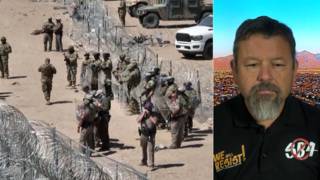
An immigration battle continues on the border between Texas and Mexico, as Texas’s state government increases its militarization of the region, deploying hundreds of National Guard troops and constructing new infrastructure on the border. Meanwhile, a new federal spending bill passed by Congress and signed into law by President Biden has increased funding for ICE and CBP, and state and federal courts have been wrangling over the legality of SB4, a new Texas state law that gives local police sweeping powers to arrest and deport anyone they suspect has entered the United States without authorization. We hear more from Fernando García, founder and executive director of the Border Network for Human Rights, in El Paso. García says the influx of special forces with “no training with how to deal with a civilian population,” alongside the “show me your papers’’ atmosphere created by SB4, is increasing the daily violence faced by Latinx residents on the U.S. side of the border, all while “illegally impeding” the right to seek asylum by those in “desperate” straits on the Mexico side. Instead of capitulating to anti-immigrant politicians, he continues, “We needed for the federal government to stop Texas, stop the governor” from targeting “Latinos, people of color, migrants and people looking for asylum, for protection.”
This content originally appeared on Democracy Now! and was authored by Democracy Now!.
This post was originally published on Radio Free.

Six people are missing and presumed dead after a 984-foot cargo ship hit the Francis Scott Key Bridge in Baltimore, causing the bridge’s collapse early Tuesday morning. All six have been identified as immigrant construction workers originally hailing from Mexico, Guatemala, El Salvador and Honduras. Maryland Governor Wes Moore said the crew on the ship was able to issue an emergency mayday call before colliding with the bridge, which allowed authorities to stop incoming traffic and prevent more casualties. However, reports say the workers already on the bridge were not given similar warnings. “The question we should be asking about is why the folks on that bridge … had no direct line to emergency dispatch when they are clearly working in a potentially hazardous environment,” says journalist Maximillian Alvarez, the editor-in-chief of the Baltimore-based organization The Real News Network, who has been closely following the story and how it has affected immigrant and working-class communities. “What does this story actually show us? That immigrants are filling our potholes at night so that we can have a smooth drive to work in the morning,” Alvarez says. “I hope people can see this and see the humanity in us.”
This content originally appeared on Democracy Now! and was authored by Democracy Now!.
This post was originally published on Radio Free.
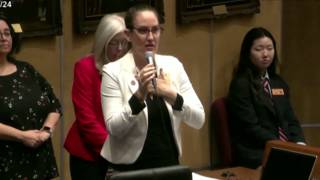
Democratic Arizona state Senator Eva Burch made headlines last week after speaking on the floor of the state Senate about her plans to obtain an abortion after receiving news that her pregnancy was nonviable. Arizona has banned all abortions after 15 weeks of pregnancy. “I felt like it was really important for me to bring people along, so that people could really see what this looks like,” says Burch, a former nurse practitioner who worked at a women’s health clinic before running for office, about why she decided to publicly tell her story. “I wanted to pull people into the conversation so we can be more honest about what abortion care looks like” and “hopefully move the needle in the right direction,” she adds.
This content originally appeared on Democracy Now! and was authored by Democracy Now!.
This post was originally published on Radio Free.

The Supreme Court heard oral arguments Tuesday on the abortion pill mifepristone, which is available by mail and can be taken at home, even in states that have severely limited or banned abortions. The case was brought by a group of anti-choice medical associations that have sought to overturn moves by the Food and Drug Administration to increase access to the drug, which is used for roughly two-thirds of all U.S. abortions. This was the first abortion-related Supreme Court hearing since the court overturned Roe v. Wade in 2022. A decision is expected by July. “Overall the justices showed that they were skeptical of the claims brought by the plaintiffs in this case,” says Michele Goodwin, a law professor at Georgetown University and founding director of the Center for Biotechnology and Global Health Policy. Goodwin summarizes the arguments presented by both sides, the justices’ responses and the legal implications of the upcoming ruling.
This content originally appeared on Democracy Now! and was authored by Democracy Now!.
This post was originally published on Radio Free.
Democracy Now! Wednesday, March 27, 2024
This content originally appeared on Democracy Now! Audio and was authored by Democracy Now!.
This post was originally published on Radio Free.
This content originally appeared on Democracy Now! and was authored by Democracy Now!.
This post was originally published on Radio Free.
This content originally appeared on Democracy Now! for Broadcasters – HD MP4 and was authored by Democracy Now! for Broadcasters – HD MP4.
This post was originally published on Radio Free.
This content originally appeared on Democracy Now! and was authored by Democracy Now!.
This post was originally published on Radio Free.
This content originally appeared on Democracy Now! and was authored by Democracy Now!.
This post was originally published on Radio Free.
This content originally appeared on Democracy Now! and was authored by Democracy Now!.
This post was originally published on Radio Free.

We look at Donald Trump’s ongoing legal battles with Pulitzer Prize-winning reporter David Cay Johnston, who has been covering Trump since the 1980s. The next major case against Trump is his hush money trial, set to begin April 15, in which he is accused of falsifying business records to cover up payments to adult film star Stormy Daniels to keep an extramarital affair quiet during the 2016 presidential campaign. This comes as Trump is on the hook to produce $175 million to cover a civil fraud judgment in New York, where his bond was originally set at $454 million. Other cases against Trump, including over his attempts to overturn the 2020 election and his handling of classified documents after he left office, are still ongoing. “Donald Trump has committed serious criminal acts his whole life, and … he’s finally being held to account,” says Johnston.
This content originally appeared on Democracy Now! and was authored by Democracy Now!.
This post was originally published on Radio Free.
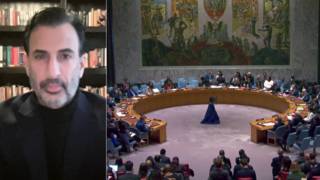
We speak with former top U.N. human rights official Craig Mokhiber after the Security Council voted Monday on a resolution calling for an immediate ceasefire in Gaza and the release of all remaining hostages. The United States abstained from the vote, allowing it to pass after nearly six months of obstructing similar efforts at the Security Council. Mokhiber, who resigned in October over the U.N.'s failure to address rights violations in Israel-Palestine, says “Israel has the world record” for violating U.N. resolutions and is certain to violate this ceasefire resolution, as well, even though it expressed “the very broad consensus across the global community against Israel's onslaught on Gaza.” Israel continued bombing Gaza after Monday’s vote, and top Israeli leaders have vowed to continue the war that has killed over 32,000 Palestinians so far. “What this genocide has done is it has revealed the weaknesses, the political compromises, the moral failings of the United Nations and other international institutions,” says Mokhiber, who adds that continued pressure from civil society is needed to end the bloodshed.
This content originally appeared on Democracy Now! and was authored by Democracy Now!.
This post was originally published on Radio Free.
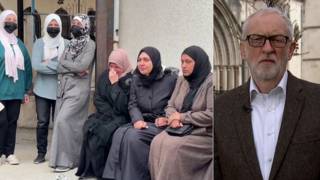
Former U.K. Labour Party leader Jeremy Corbyn reacts to the United Nations Security Council’s resolution for an immediate ceasefire in Gaza, which passed 14-0 on Monday after the United States declined to use its veto by abstaining from the vote. Corbyn calls the war and suffering in Gaza “a global disgrace” and says the ceasefire must be enforced. “It’s time to stand with the Palestinian people.”
This content originally appeared on Democracy Now! and was authored by Democracy Now!.
This post was originally published on Radio Free.
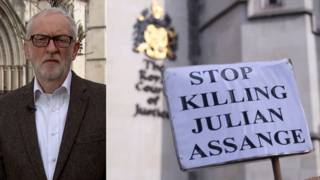
The British High Court in London has put the extradition of Julian Assange on hold until the United States provides assurances that he would get a fair trial in the U.S. without facing the death penalty. If those assurances are not met, Assange will be granted the right to a full appeal hearing. Speaking outside the court Tuesday, Stella Assange called for the Biden administration to “drop this shameful case” against her husband. “Julian should never have been imprisoned for a single day,” she said. We speak with MP Jeremy Corbyn, who led the U.K. Labour Party from 2015 to 2020 and who has been calling for all charges against Assange to be dropped. “The pressure needs to now go on to the Biden administration,” Corbyn says. “If Julian goes down for this, every serious journalist around the world is going to be slightly more cautious about exposing war crimes, about exposing corporate greed.”
This content originally appeared on Democracy Now! and was authored by Democracy Now!.
This post was originally published on Radio Free.
Democracy Now! Tuesday, March 26, 2024
This content originally appeared on Democracy Now! Audio and was authored by Democracy Now!.
This post was originally published on Radio Free.
This content originally appeared on Democracy Now! and was authored by Democracy Now!.
This post was originally published on Radio Free.